Basundi is a rich, creamy and thickened milk made by boiling full cream milk with sugar till it is reduced to half. It is flavored with cardamom, saffron, nutmeg and nuts. It can be enjoyed warm or chilled. It is a traditional and popular sweet dish made in the western parts of India like Gujarat and Maharashtra and is relished during festivals such as Janmashtami, Navratri, Bhai Bhij, Diwali or Holi. It is gluten free and can be eaten during fasting. Basundi is served with poori (puffed deep fried roti), undhiyu , bhajia, rice and dal.
Today is my Father-in-law’s (Chetan Shah) birthday. He lives in Bharuch, Gujarat, India. He has a sweet tooth and basundi is his favorite sweet. He needs no occasion to eat basundi. He will tell my mother in law (Geeta Shah) : “Geeta, aaje basundi banavi deje”. My mother in law will follow his instructions and make basundi for him. I am in Sydney and am presenting him Basundi as a virtual treat on his birthday!
Wishing you a very happy birthday papa!! Have a wonderful day and keep on showering your blessings, love and support on us. Thank you for everything!!
I am sharing with you a step by step video of making basundi.
I remember when we had big family get together during festivals, my mother in law would get up early in the morning and would start making basundi by boiling milk in a big thick bottom pot. She did not want to get interrupted and wanted to make it first before making other dishes. Also many people in the family like to eat chilled basundi for lunch and hence if the basundi is ready in advance, it gets time to get chilled in the refrigerator.
Besides the traditional basundi, we get different varieties of basundi in the sweet shops, such as sitafal (custard apple) basundi, strawberry basundi, narangi (orange) basundi, mango basundi and khajur anjeer (dates and fig) basundi.
To make these different variations of basundi, boil the milk to half the quantity with sugar and then chill the milk completely. Once the milk is chilled add the puree and chopped pieces of different fruits such as custard apple, strawberry, orange, mango, dates and figs and mix well and serve the respective basundi chilled. The fruits are citrus and hence it is good to add them when the milk is chilled to avoid curdling of the milk. Also consume the fruit based basundi immediately.
Few points to be noted while making basundi:
- Always use a heavy bottom pan
- Add little water at the bottom of the pan to prevent milk from sticking at the bottom.
- Use full fat milk
- Bring the milk to boil on low heat first while stirring in between. This will not give a burnt smell to the milk as full fat milk tends to stick to the bottom quickly when boiled on high heat. Then boil it on high heat till it reduces to half. Keep in stirring milk continuously and scrape the cream which is formed and sticks to the sides of the vessel.
- Use flat spatula to stir the milk instead of a laddle or spoon.
- The basundi tends to thicken on cooling and so if you want to eat it chilled, boil it a bit less.
- The sugar level can be adjusted as per your preference.
I hope you all enjoyed the video of making basundi. Please like, share and subcribe my channel.
Khao dilse, khilao dilse, aur banao dilse!!
Happy cooking!!
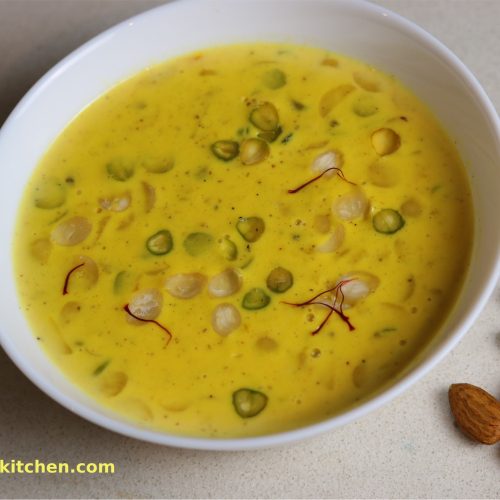
Basundi
Ingredients
- 1 l full fat milk
- 1/4 cup sugar I have not entirely used 1/4 cup of sugar. The sweetness level can however be adjusted as per taste
- 8 almond blanched, peeled and sliced
- 6 pistachio blanched, peeled and sliced
- 1/4 tsp nutmeg powder powder
- 1 tsp cardamom powder elaichi powder
- 1 tsp saffron kesar
- 1 tbsp water
Instructions
- Keep a thick bottom pan on heat. Add little water at the bottom of the pan to prevent milk to stick at the bottom of the pan.

- Add milk to the pan.

- Low the heat and bring milk to boil. Stir in between

- It will take around 7-8 minutes to milk to boil. You can keep the heat on medium if you are near the vessel and continuously stirring the milk.

- Once the milk has started boiling, reduce the heat and add some of the chopped almonds and pistachio and saffron.


- Grate the nutmeg in the milk or add nutmeg powder.

- Mix well and continuously heat the milk on high heat till it is reduced to half.

- The layer of cream will form on the top of the milk. Stir it and also scrap the sides of the vessel to remove the cream and mix it with boiling milk.
- After 8-10 minutes the colour of saffron will nicely infuse in the milk and the milk will be reduced.

- Add sugar to the reduced milk and stir till the sugar is dissolved.

- Add cardamom powder to it and mix well.

- The milk is reduced to half and is nice thick and creamy. The basundi is ready. The basundi tends to thicken on cooling and so if you want to eat it chilled, boil it a bit less.

- Serve it in a bowl and garnish with remaining almonds , pistachio and saffron.

- Enjoy the basundi warm or chilled. In Gujarat and Maharashtra basundi is served with poori (puffed deep fried roti).



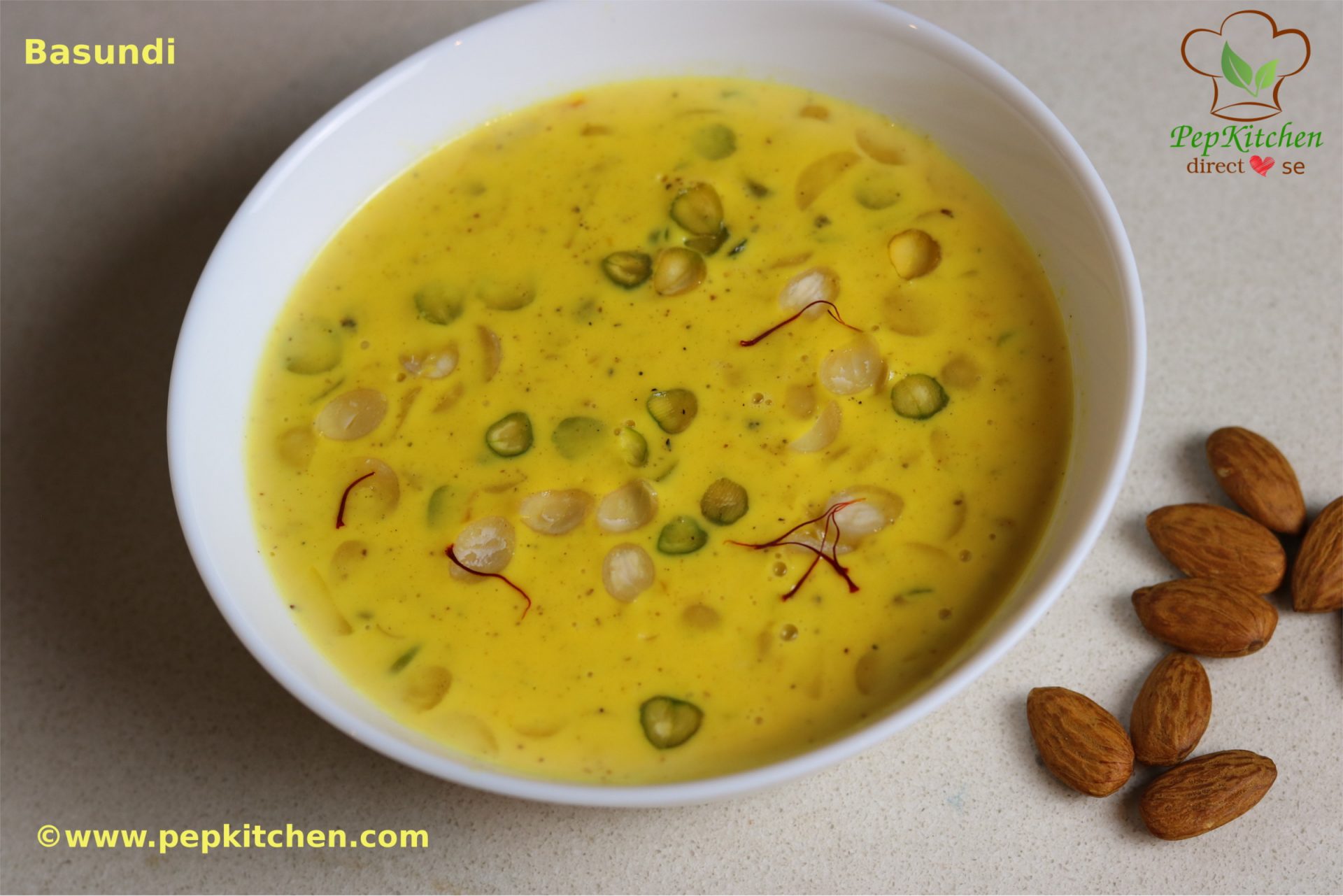
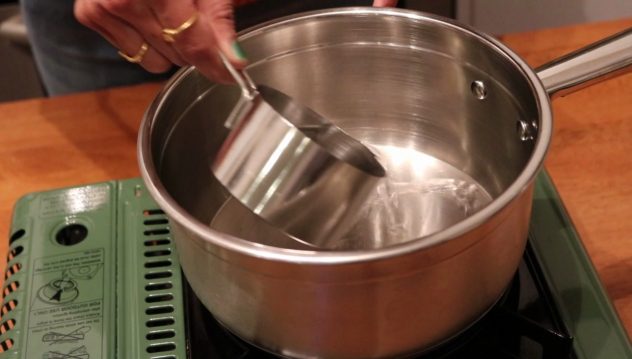
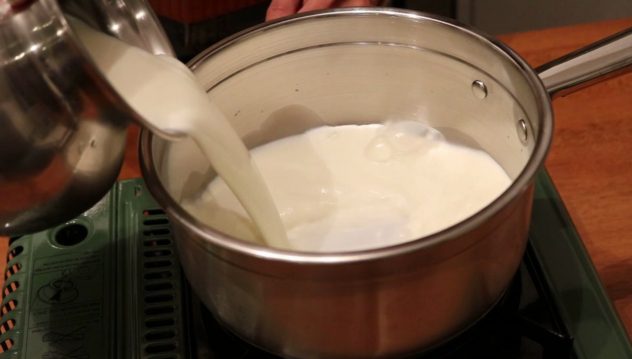
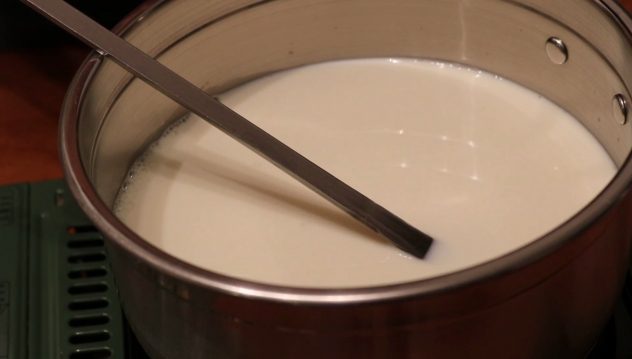
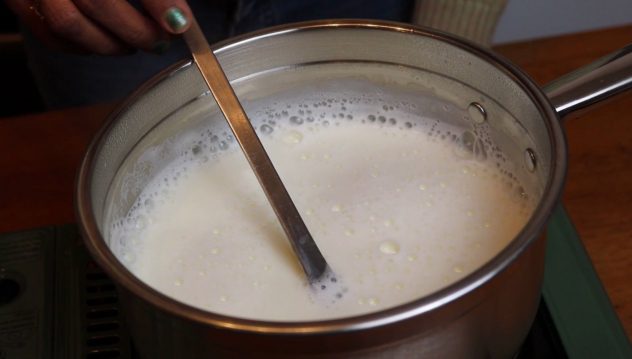
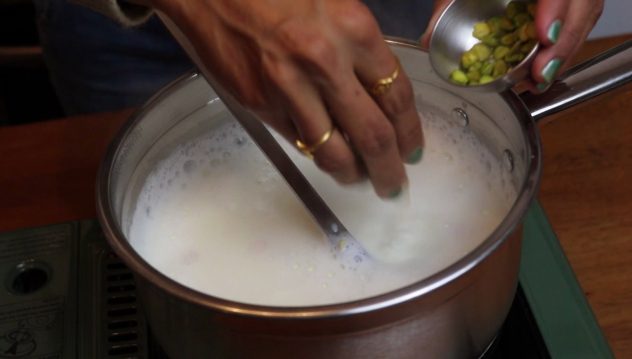
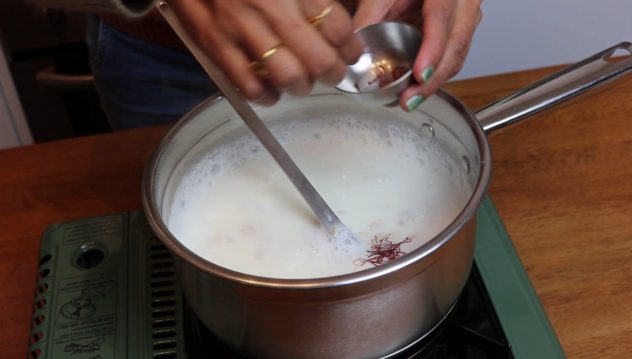
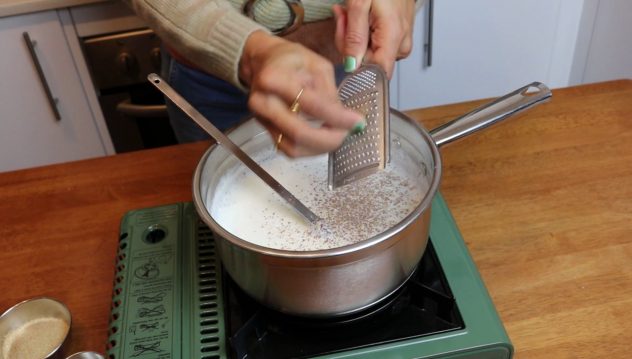
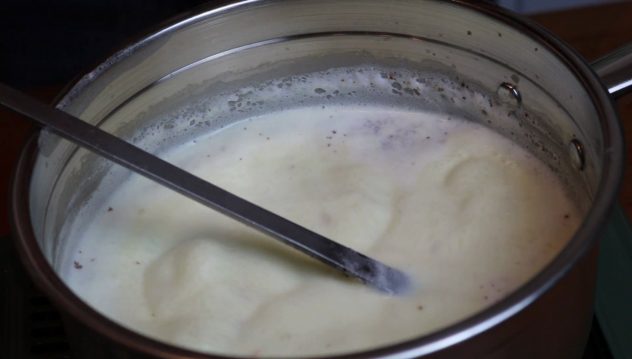
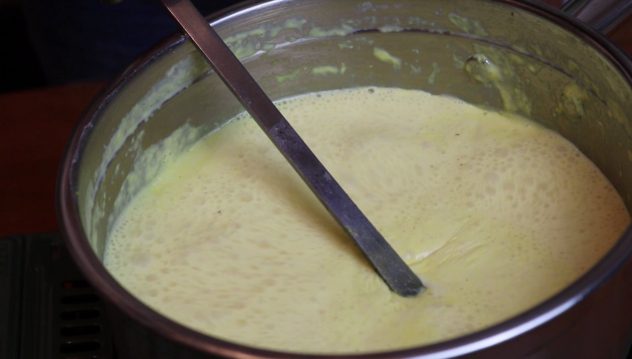
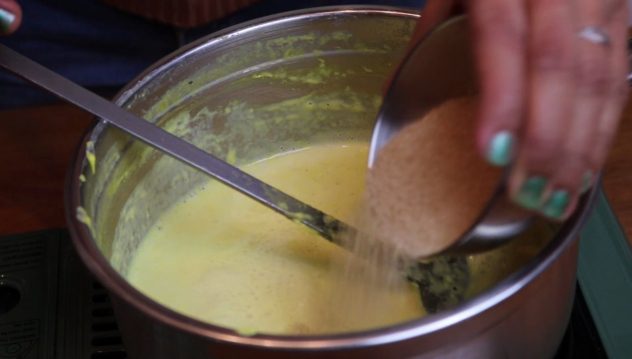
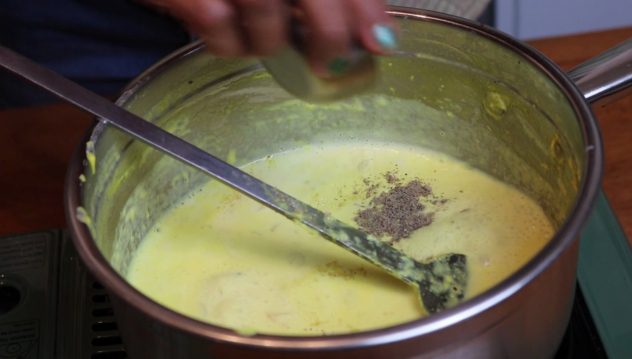
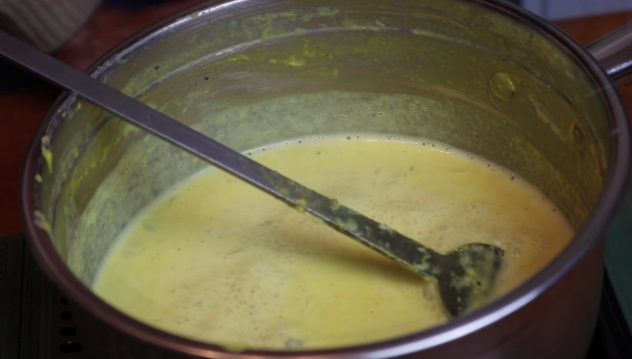
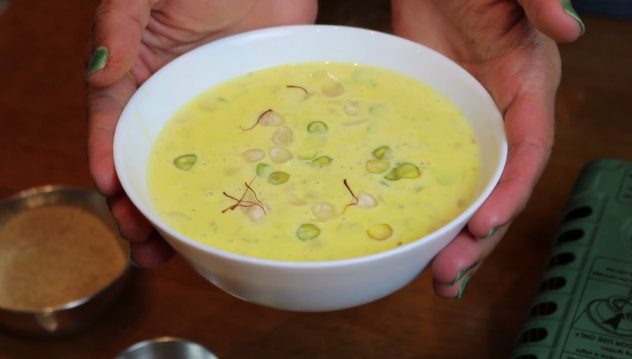
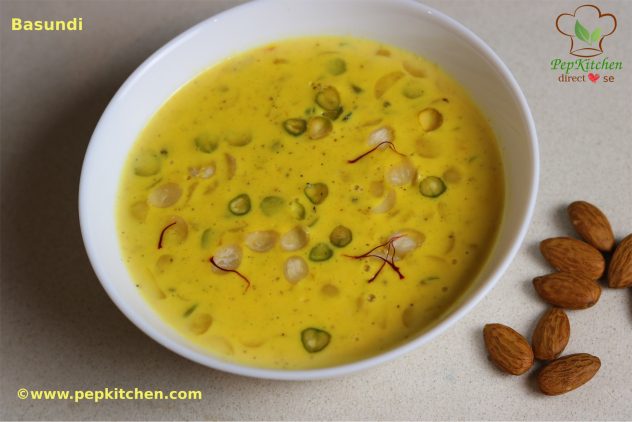
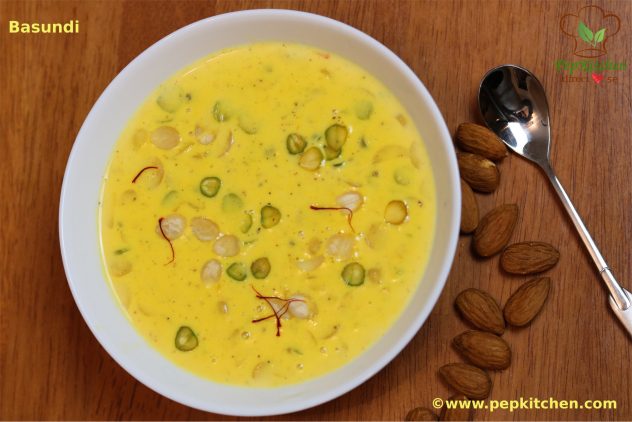

amazing recipe for all occasion. Nice video!!
Awesome blog! Do you have any hints for aspiring writers?
I’m hoping to start my own website soon but I’m a little lost on everything.
Would you advise starting with a free platform like
Wordpress or go for a paid option? There are so many choices out there that I’m completely confused ..
Any recommendations? Many thanks!
Thank you so much!! WordPress is a very good option to start your own blog. All the best for your blog!!